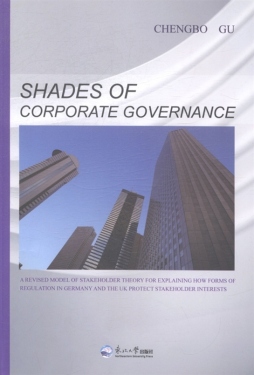公司治理比较研究
出版社:东北大学出版社
年代:2014
定价:78.0
书籍简介:
本书专注于比较研究不同国家(主要是英国和德国)的公司法和公司治理方面的相关法律制度(包括相关的欧盟法规),以及相应法律制度建立的公司治理模式和机制下的利益关系人(如公司的员工,客户,供应商,借款银行,以及所在社区)的权利和福利保护问题。通过改进设计的用于规范公司行为和保护利益关系人利益的公司治理模型(a revised model of stakeholder theory),可以研究发现不同的国家在自己特有的公司治理模式和机制下,采用不同的方法来促使公司在从事商业行为的同时关注商业行为本身的道德与伦理问题,进而促进公司积极的承担社会责任,并有效的保护公司利益关系人的权利和福利。这有利于改善商业(公司)与社会的关系,并且有益于公司的长期和持续的发展。从研究中也可以发现,尽管各国的法律制度和公司治理模式不同,但是多种措施综合使用后的利益关系人保护效果是接近一致的。这也意味着利益关系人理论是可以付诸实际应用的,利益关系人的保护也是可以在不同的公司治理模式下实现的。这个研究主要涉及如下的几个方面,如公司董事会的构成和职能方面的设计,机构投资者参与公司治理的动机,方式和影响,公司高管人员薪酬与社会责任的连接,市场对公司的控制和约束,以及工会组织和其它社会团体对公司的影响和约束力等。
作者介绍:
书籍目录:
ABSTRACT
LIST OF ABBREVIATIONS
LIST OF STATUTES
CHAPTER ONE
INTRODUCTION
Section 1.1 Research Background
Section 1.2 Research Objectives
Section 1.3 Research Methodology
Section 1.4 Structure of the Book
CHAPTER TWO
AGENCY THEORY VERSUS STAKEHOLDER THEORY
Section 2.1 Introduction
Section 2.2 Agency Theory
2.2.1 Overview of Agency Theory
2.2.2 Agency Conflicts and Solutions
2.2.3 Support and Criticism of Agency Theory
Section 2.3 Stakeholder Theory and Stakeholder Model
2.3.1 Stakeholder Theory
2.3.2 Difficulties and Solutions to Identification of Stakeholders
2.3.3 Difficulties and Solutions to Implementation of Stakeholder
Theory
Section 2.4 Conclusion
CHAPTER THREE
THEORETICAL FRAMEWORK FOR IMPLEMENTATION OF STAKEHOLDER THEORY
Section 3.1 Introduction
Section 3.2 Revised Model of Stakeholder Theory
3.2.1 Interest Alignment Mechanisms
3.2.2 Civil Regulation and Social Capital
3.2.3 Statutory Regulation and Legal Enforcement
3.2.4 Justification of Revised Stakeholder Theory Model
Section 3.3 Applying the Model in Germany and the OK
3.3.1 Reasons of Applying the Model in Germany and the UK
3.3.2 Classifying by Legal Systems
3.3.3 Classifying by Corporate Governance Systems
Section 3.4 Five Mechanisms for Protecting Stakeholder Interests
Section 3.5 Conclusion
CHAPTER FOUR
BOARD OF DIRECTORS IN GERMANY AND THE UK
Section 4.1 Introduction
Section 4.2 Board of Directors
4.2.1 Functions of Board of Directors
4.2.2 Composition of Board of Directors
4.2.3 Independence of Board of Directors
4.2.4 Size of Board of Directors
Section 4.3 Board of Directors in Germany
4.3.I Strict Separation of Control and Management
4.3.2 Codetermination between Employees and Shareholders
4.3.3 Monitring Power and Effects of Banks
Section 4.4 Board of Directors in the UK
4.4.1 Weak Independence of Board of Directors
4.4.2 Board Composition without Stakeholder Representatives
4.4.3 Non-Exhaustive Reform of Company Law
Section 4.5 Discussion and Conclusion
CHAPTER FIVE
INSTITUTIONAL INVESTORS IN GERMANY AND THE UK
Section 5.1 Introduction
Section 5.2 Supervisory Role of Institutional Investors
5.2.1 Significance of Institutional Investor Activism
5.2.2 Monitoring Incentive of Institutional Investors
5.2.3 Monitoring Ability of Institutional Investors
5.2.4 Possible Barriers of Institutional Investor Activism
5.2.5 Approaches of Institutional Investors for Stakeholder Protection
5.2.6 Impact of SRI Investments on Stakeholder Interests
Section 5.3 Institutional Investors in Germany
5.3.1 Internal Blockholders' Control and Stakeholder Protection
5.3.2 Development of Socially Responsible Investment
5.3.3 Market for Partial Corporate Control
Section 5.4 Institutional Investors in the UK
5.4.1 Increase of Institutional Share Ownership
5.4.2 Institutional Investor Activism and Social Reporting System
5.4.3 Social Performance of Institutional Investors
Section 5.5 Discussion and Conclusion
CHAPTER SIX
MANAGERIAL COMPENSATION SYSTEM IN GERMANY AND THE UK
Section 6.1 Introduction
Section 6.2 Managerial Compensation System
6.2.1 Managerial Compensation and Stakeholder Protection
6.2.2 Managerial Compensation Arrangements and Package
6.2.3 Managerial Performance Measurement
6.2.4 Complementary Effects of Other Governance Mechanisms
6.2.5 Impact of Managerial Compensation on Stakeholder Interests
Section 6.3 Managerial Compensation System in Germany
6.3.1 Development of Managerial Compensation System
6.3.2 Legal Reform of Managerial Compensation System
Section 6.4 Managerial Compensation System in the UK
6.4.1 Remedies for Weak Influence of Stakeholders
6.4.2 Impact of Say-on-Pay Regulation
6.4.3 Civil Regulatory Pressure of Non-Governmental Organisations
Section 6.5 Discussion and Conclusion
CHAPTER SEVEN
MARKET FOR CORPORATE CONTROL IN GERMANY AND THE UK
Section 7.1 Introduction
Section 7.2 Market for Corporate Control
7.2.1 Hostile Takeover and Internal Governance Failure
7.2.2 Barriers of Market for Corporate Control
7.2.3 Takeover Impact on Stakeholder Welfare
Section 7.3 Market for Corporate Control in Germany
7.3.1 Takeover Market and Takeover Regulations
7.3.2 Takeover Barriers in Germany
Section 7.4 Market for Corporate Control in the UK
7.4.1 Takeover Regulations of the UK
7.4.2 Elimination of Takeover Barriers in the UK
7.4.3 Stakeholder Protection in Takeover Process
Section 7.5 Discussion and Conclusion
CHAPTER EIGHT
TRADE UNION AND LABOUR MARKET IN GERMANY AND THE UK
Section 8.1 Introduction
Section 8.2 Trade Union and Labour Market
8.2.1 Governance Role of Employees
8.2.2 Trade Union and Firm Performance
8.2.3 Labour Market and Firm Performance
Section 8.3 Trade Union and Labour Market in Germany
8.3.1 Social and Economic Culture in German Labour Market
8.3.2 Strict Legal Protection for Employment
8.3.3 Collective Agreement and Employee Protection
8.3.4 Strict Employment Protection and Labour Market Flexibility
Section 8.4 Trade Union and Labour Market in the UK
8.4.1 Social and Economic Culture in UK Labour Market
8.4.2 Trade Union Recognition and Employee Protection
8.4.3 Insufficient Rights to Information and Consultation of Employees
8.4.4 Protection to Other Employee Rights and Stakeholder Interests
Section 8.5 Discussion and Conclusion
CHAPTER NINE
CONCLUSION
Section 9.1 Discussion and Contribution
9.1.1 Significance and Completeness of Stakeholder Theory
9.1.2 Significance of Revised Stakeholder Theory Model
9.1.3 Implementation of Stakeholder Theory in Practice
Section 9.2 Possible Limitations of This Research
Section 9.3 Implication for Future Research
REFERENCES
内容摘要:
《公司治理比较研究:以修正的利益关系人理论模型解读英德公司治理实践(英文版)》专注于比较研究不同国家(主要是英国和德国)的公司法和公司治理方面的相关法律制度(包括相关的欧盟法规),以及相应法律制度建立的公司治理模式和机制下的利益关系人(如公司的员工,客户,供应商,借款银行,以及所在社区)的权利和福利保护问题。通过改进设计的用于规范公司行为和保护利益关系人利益的公司治理模型(a revised model of stakeholder theory),可以研究发现不同的国家在自己特有的公司治理模式和机制下,采用不同的方法来促使公司在从事商业行为的同时关注商业行为本身的道德与伦理问题,进而促进公司积极的承担社会责任,并有效的保护公司利益关系人的权利和福利。
这有利于改善商业(公司)与社会的关系,并且有益于公司的长期和持续的发展。从研究中也可以发现,尽管各国的法律制度和公司治理模式不同,但是多种措施综合使用后的利益关系人保护效果是接近一致的。这也意味着利益关系人理论是可以付诸实际应用的,利益关系人的保护也是可以在不同的公司治理模式下实现的。这个研究主要涉及如下的几个方面,如公司董事会的构成和职能方面的设计,机构投资者参与公司治理的动机,方式和影响,公司高管人员薪酬与社会责任的连接,市场对公司的控制和约束,以及工会组织和其它社会团体对公司的影响和约束力等。
书籍规格:
| 书籍详细信息 | |||
| 书名 | 公司治理比较研究站内查询相似图书 | ||
| 9787551706094 如需购买下载《公司治理比较研究》pdf扫描版电子书或查询更多相关信息,请直接复制isbn,搜索即可全网搜索该ISBN | |||
| 出版地 | 沈阳 | 出版单位 | 东北大学出版社 |
| 版次 | 1版 | 印次 | 1 |
| 定价(元) | 78.0 | 语种 | 简体中文 |
| 尺寸 | 24 × 17 | 装帧 | 平装 |
| 页数 | 印数 | ||
书籍信息归属:
公司治理比较研究是东北大学出版社于2014.6出版的中图分类号为 D956.122.9 ,D951.622.9 ,F279.504.6 的主题关于 公司法-对比研究-英国、德国 ,公司-企业管理-对比研究-英国、德国 的书籍。
